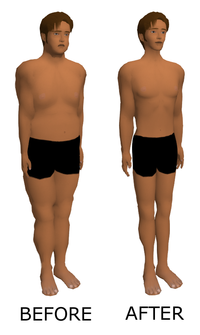
Photo from wikipedia
Executive functions (EFs) are hypothesized to play a role in the development and maintenance of obesity due to their role in self-regulatory processes that manage energy-balance behaviors. Children with obesity… Click to show full abstract
Executive functions (EFs) are hypothesized to play a role in the development and maintenance of obesity due to their role in self-regulatory processes that manage energy-balance behaviors. Children with obesity have well-documented deficits in EF, which may impede effectiveness of current, evidence-based treatments. This review examines top-down EF processes (e.g., inhibitory control, working memory, cognitive flexibility), as well as bottom-up automatic processes that interact with EFs (e.g., attentional bias, delay discounting) and their relation to weight-loss treatment success in children. It then evaluates EF-related interventions that may improve treatment response. Empirical studies that included an intervention purported to affect EF processes as well as pre-post measurements of EF and/or relative weight in populations ages 19 or younger with overweight/obesity were reviewed. Findings indicate that poorer EF may hinder treatment response. Moreover, there is preliminary evidence that behavioral weight loss intervention and physical activity may positively affect EF and that improvements in EF are related to enhanced weight loss. Finally, novel intervention strategies, such as computer training of core EFs, attention modification programs, and episodic future thinking, show promise in influencing both EFs and EF-related skills and weight. Further research is needed to provide more conclusive evidence of the efficacy of these interventions and additional applications and settings should be considered.
Journal Title: Appetite
Year Published: 2018
Link to full text (if available)
Share on Social Media: Sign Up to like & get
recommendations!